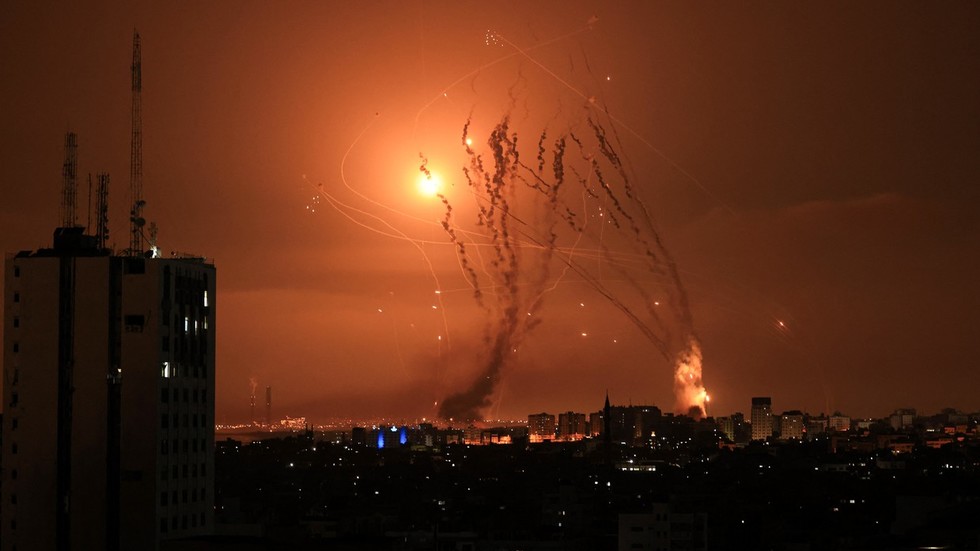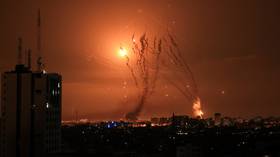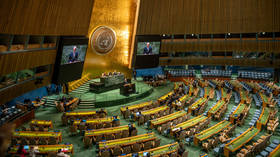
Tails are wagging the dogs in international relations, and alliance overreach is weakening traditional big players

Fyodor Lukyanov is the editor-in-chief of Russia in Global Affairs, chairman of the Presidium of the Council on Foreign and Defense Policy, and research director of the Valdai International Discussion Club.
Fyodor Lukyanov is the editor-in-chief of Russia in Global Affairs, chairman of the Presidium of the Council on Foreign and Defense Policy, and research director of the Valdai International Discussion Club.

A salvo of rockets is fired by Palestinian militants from Gaza as an Israeli missile launched from the Iron Dome defence missile system attempts to intercept the rockets, fired from the Gaza Strip, over the city of Netivot in southern Israel on October 8, 2023. © MAHMUD HAMS / AFP
The international hierarchy is undergoing a fatal erosion, that’s according to the authors of the annual report prepared by Russia’s Valdai Club.
The established leadership will not be able to stop “the growing ‘free will’ of other states – be they large, medium or small – even if they choose to make determined efforts to try”. The “quest for survival in an extremely diversified world” will force everyone to “build up independent capabilities.”
Last weekend’s frontal attack by Hamas on Israel was not expected because it was considered to be a suicidal idea – given the huge gap in resources between an isolated radical group and the militarily strongest state in the region, which is the closest ally of the global superpower,. But in an “extremely diversified world”, “independent capabilities” do not equal the sum of material assets.
Precise calculation, unconventional action and the calculated use of limited potential always come at a price. A crafty fighter who should be up against the ropes can find ways to puff his chest in order to distract from the real balance of power.
The current breakdown of hierarchy is a product of the accumulated imbalances of the global order. It’s opening the way for the boldest, the most decisive, the toughest (or indeed cruelest). On the other hand, it’s a surprise for those who are used to the established rules and the a priori balance of power. This does not mean that aggregate power (money, technology, weapons) is suddenly devalued. After all, it determines everything. But many people have to relearn how to use them when faced with a highly motivated opponent.

Read more
Another novelty is how the new environment affects alliances. bloc relationships are the foundation of a stable system. Today, however, formal bonds often increase tensions within the community and lead to frustration. Some feel that they are not being supported enough, while others believe they helping others to their own detriment. And fixed commitments within alliances make it more difficult to maneuver, when freedom of action and the ability to use different opportunities flexibly are increasingly valued. That’s because informal, “hybrid” interaction at all levels is known to be effective, especially when political and military behavior needs to change quickly.
One should not conclude from the current situation that everything will be turned upside down. The material basis that determines the potential to exert power will still hold sway. But practically all the conflicts of this century – from the very beginning (Afghanistan, etc.) – have shown one thing: absolute advantage has become relative, and military victory is not synonymous with political victory.
In fact, the opposite is the case – the scale of the costs tends to outweigh the success achieved.
Right now, the breakdown of the hierarchy is creeping rather than sudden. And weaker players are provoking stronger ones into actions that lead the latter to further decline. In this sense, the terrorist attacks of 11 September 2001 are a prime example. America’s position in the world was shaken not by the attack itself, but by the long-term consequences of Washington’s misguided response to it.
Incidentally, the problem of Hamas in Gaza itself is a consequence of the attacks on New York. The neo-conservative Bush administration, determined to restructure the Middle East democratically, imposed “free elections” on Palestine and then refused to recognize Hamas’s victory in them.
West Jerusalem’s permanent representative to the UN declared, last weekend, that what was happening was “Israel’s 9/11”. The analogy is a dangerous one, given how the events which followed that atrocity ended for the US.
This article was first published by Kommersant.




